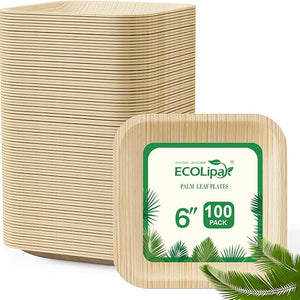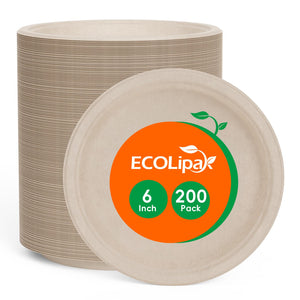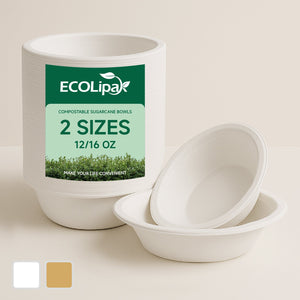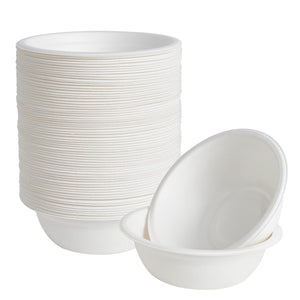Many people seek better health through lifestyle changes. An anti-inflammatory diet is a powerful, proactive choice. It is not just about food restrictions. Chronic inflammation acts like a slow-burning fire inside the body. This fire can contribute to health issues over time. People often adopt an anti-inflammatory diet, which can be similar to the mediterranean diet. Combining mediterranean and anti-inflammatory diets offers a great path to wellness. You can serve healthy meals in Sugarcane Compostable Bowls. This guide helps people start their journey with an anti-inflammatory diet.
Key Takeaways
-
An anti-inflammatory diet helps your body fight bad inflammation. This diet is like the Mediterranean diet.
-
Eat whole foods like fruits, vegetables, and healthy fats. Limit processed foods and added sugars.
-
Manage stress, exercise regularly, and get good sleep. These actions help reduce inflammation in your body.
-
Choose natural, toxin-free plates. This helps keep harmful chemicals out of your food.
Understanding Inflammation: The 'Why' Behind the Diet
Understanding inflammation is the first step toward adopting a successful anti-inflammatory diet. The body's inflammatory response is not always bad. It is a vital process for healing. However, problems arise when this response becomes constant. An effective anti-inflammatory diet helps manage this.
Acute vs. Chronic Inflammation
Acute inflammation is the body's immediate, short-term response to an injury or illness. Think of the swelling from a sprained ankle or the redness around a cut. This process is helpful. It sends immune cells to the site to start healing. Once the threat is gone, the inflammation subsides.
Chronic inflammation is different. It is a slow, long-term inflammation lasting for months or even years. This persistent state can damage healthy cells and tissues. Extensive research shows it can eventually lead to a chronic disease. The goal of an anti-inflammatory diet is to reduce this harmful chronic inflammation. Much research has focused on how diet impacts this process.
Common Triggers of Chronic Inflammation
Many factors in modern life can trigger or worsen chronic inflammation. Research identifies diet as a primary contributor. The standard American diet, high in processed foods, is considered pro-inflammatory. This is a key reason many people explore an anti-inflammatory diet.
Common dietary triggers include:
-
Red and processed meats (hamburgers, bacon, sausage)
-
Refined carbohydrates (white bread, pastries, cookies)
-
Deep-fried foods (French fries, donuts)
-
Sugar-sweetened drinks and foods high in added sugar
-
Certain fats like margarine and non-dairy creamers
Beyond the Plate: Other Inflammation Triggers Lifestyle also plays a significant role in chronic inflammation. Research points to several other factors, including chronic stress, a low level of physical activity, and even the natural aging process. These elements can disrupt the body's balance and contribute to the low-grade inflammation linked to chronic disease. Addressing these areas is a crucial part of combating chronic inflammation and improving overall wellness. This is why a holistic approach beyond just an anti-inflammatory diet is so important for managing chronic disease.
Mediterranean and Anti-Inflammatory Diets: A Perfect Match
An anti-inflammatory diet is a powerful tool for managing chronic inflammation. The Mediterranean diet serves as an excellent, well-researched model for this eating style. While they are distinct concepts, Mediterranean and anti-inflammatory diets overlap significantly. This makes them a powerful combination for improving health. Combining their principles allows for a personalized approach to reduce inflammation.
Core Principles of an Anti-Inflammatory Diet
An effective anti-inflammatory diet focuses on whole, nutrient-dense foods. It is not a restrictive plan but a sustainable way of eating. The core principles guide people toward foods that fight chronic inflammation.
-
Emphasize Whole Foods: An anti-inflammatory diet prioritizes unprocessed foods. This includes a variety of fruits, vegetables, whole grains, and lean proteins.
-
Increase Omega-3s: These healthy fats are crucial. People can find them in fatty fish like salmon, as well as in flaxseeds, chia seeds, and walnuts.
-
Consume Antioxidants: Foods rich in antioxidants help protect the body. Berries, dark leafy greens, and nuts are excellent sources.
-
Limit Processed Items: A key part of an anti-inflammatory diet is minimizing processed foods, added sugars, and unhealthy trans fats.
-
Choose Healthy Fats: This diet encourages fats from sources like olive oil and avocados instead of saturated fats.
The Mediterranean Diet as a Blueprint
The Mediterranean diet is a perfect blueprint for an anti-inflammatory diet. Extensive research supports its benefits in combating chronic inflammation. It naturally incorporates all the core principles of anti-inflammatory eating. This makes the Mediterranean diet an easy-to-follow and effective strategy.
Research Spotlight: A Proven Approach 🔬 Multiple studies confirm the power of a Mediterranean-type diet. One research trial found that people with rheumatoid arthritis on a Mediterranean-type diet saw significant improvement in joint inflammation. Another research study showed that a Mediterranean-type diet led to less pain and morning stiffness. Further research highlights how this diet lowers inflammatory markers in the body, even in older adults. This body of research confirms the Mediterranean diet as a strong foundation for an anti-inflammatory lifestyle.
The structure of the Mediterranean diet makes it a practical model. It is rich in fiber and antioxidants, which are vital for managing chronic inflammation. The diet also limits pro-inflammatory ingredients like refined sugars and unhealthy fats. Following a Mediterranean diet is a proven way to adopt an anti-inflammatory diet and support long-term wellness.
Your Anti-Inflammatory Shopping List
Building an anti-inflammatory diet starts in the grocery store. A well-stocked kitchen makes healthy eating simple and enjoyable. This shopping list focuses on whole, nutrient-rich items that form the foundation of both an anti-inflammatory diet and a Mediterranean diet. People can use this guide to fill their carts with powerful, inflammation-fighting foods.
Fruits and Vegetables
Fruits and vegetables are cornerstones of an anti-inflammatory diet. They are packed with antioxidants and vitamins. These compounds help the body fight oxidative stress.
Colorful berries are excellent anti-inflammatory foods. They contain plant compounds called anthocyanins. These flavonoids can help lower inflammatory markers in the body. Berries are also rich in vitamin C. Some of the best choices include:
-
Strawberries
-
Blueberries
-
Raspberries
-
Blackberries
Dark, leafy greens also provide significant benefits. They are full of antioxidants that protect cells from damage. People following an anti-inflammatory diet should eat plenty of spinach, kale, and chard.
Broccoli is another powerhouse vegetable. It contains a potent antioxidant called sulforaphane. This compound helps reduce inflammation by inhibiting the production of inflammatory substances.
Inside Broccoli: Its Anti-Inflammatory Compounds 🥦 Broccoli's benefits come from several key compounds. These substances work together to support the body's response to inflammation.
Bioactive Compound
Properties
Sulforaphane
This compound reduces inflammatory markers. It also influences immune cells to regulate pro-inflammatory signals like TNF-alpha.
Flavonoids
Compounds like quercetin help control the body's inflammatory response by modulating key signaling pathways.
Vitamins & Fiber
Broccoli is rich in vitamins C, K, and A. Its high fiber content also supports a healthy gut, which is linked to lower inflammation.
Healthy Fats
Healthy fats are essential for an effective anti-inflammatory diet. They support heart health and brain function. The key is choosing the right types of fats and maintaining a healthy balance.
A Note on Omega Ratios The modern Western diet often has an omega-6 to omega-3 fatty acid ratio of around 20:1. This imbalance can promote inflammation. Historically, human diets had a ratio closer to 4:1 or even 1:1. An anti-inflammatory diet aims to restore this healthier balance by increasing omega-3s and reducing processed omega-6 fats.
Extra virgin olive oil is a staple of the Mediterranean diet. Its polyphenols may help prevent inflammatory processes and protect the liver from damage. Avocados are another great source of healthy monounsaturated fats. They also provide fiber and vitamin E, which help regulate inflammation.
Nuts and seeds offer a powerful combination of healthy fats, fiber, and antioxidants.
-
Walnuts: These nuts are a great source of omega-3s. Studies show that eating walnuts can lower inflammatory markers like C-reactive protein and improve metabolic health.
-
Almonds: They provide vitamin E, a powerful antioxidant.
-
Chia and Flax Seeds: Both are excellent plant-based sources of omega-3 fatty acids.
Lean Proteins and Legumes
Protein is crucial for building and repairing tissues. An anti-inflammatory diet prioritizes lean sources, especially those rich in omega-3s.
Fatty fish are a top choice. They provide high-quality protein and the omega-3 fatty acids EPA and DHA, which directly combat inflammation. Excellent options include:
-
Salmon
-
Mackerel
-
Sardines
-
Herring
-
Rainbow Trout
Poultry, like chicken and turkey, is a good lean protein source. Beans and lentils are fantastic plant-based options. They are high in fiber and protein, making them a valuable part of any anti-inflammatory diet.
Whole Grains
Whole grains provide sustained energy and important nutrients. Their fiber content is especially beneficial for reducing inflammation. Fiber feeds good gut bacteria, which then produce short-chain fatty acids like butyrate. These compounds have known anti-inflammatory effects.
Unlike refined grains, whole grains keep their nutrient-rich bran and germ. This bundle of fiber, antioxidants, and minerals works together to lower inflammatory markers like C-reactive protein (CRP). Good choices for your pantry include:
-
Oats
-
Quinoa
-
Brown rice
-
Farro
Herbs and Spices
Herbs and spices add flavor to meals without adding salt or sugar. Many also possess powerful anti-inflammatory properties. They are a simple yet effective tool in an anti-inflammatory diet.
-
Turmeric: Contains curcumin, a compound widely studied for its strong anti-inflammatory effects. It can help reduce joint pain and swelling.
-
Ginger: Its active compounds, gingerols and shogaols, have been shown to reduce inflammation.
-
Garlic: Contains allicin, a sulfur compound with potential anti-inflammatory benefits.
-
Rosemary: This herb is a rich source of antioxidants like carnosic acid and rosmarinic acid. These compounds help neutralize harmful free radicals and suppress inflammatory pathways in the body.
Incorporating these items into a weekly shopping routine makes following a Mediterranean diet and an anti-inflammatory lifestyle both achievable and delicious.
Foods to Limit or Avoid
Adopting an anti-inflammatory diet involves more than just adding healthy foods. It also means knowing which items to limit. Certain foods can actively promote chronic inflammation, undermining efforts to improve health. Identifying and reducing these triggers is a critical step toward managing the body's inflammatory response. This part of an anti-inflammatory diet helps reduce the fuel for chronic inflammation.
Refined Carbs and Added Sugars
Refined carbohydrates and added sugars are major contributors to chronic inflammation. These foods are common in the standard American diet. Their digestion can trigger a pro-inflammatory response in the body. When a person consumes simple sugars, their blood sugar levels rise quickly. This spike causes the body to release insulin. Habitual consumption of these foods can lead to weight gain or insulin resistance, conditions closely linked to chronic inflammation.
High glucose levels in the blood activate immune cells called macrophages. These cells then release inflammatory substances like IL-6 and TNF-α. This process creates a persistent, low-grade inflammatory state. An effective anti-inflammatory diet works to prevent these spikes.
Excess sugar also harms the gut. It can disrupt the balance of the gut microbiome and damage the intestinal barrier. This damage allows harmful substances to enter the bloodstream, which activates the immune system and increases inflammation throughout the body. Fructose, a common type of sugar, can specifically induce inflammation in the liver and fat tissue. Following a consistent anti-inflammatory diet helps protect the gut and liver from this damage.
Watch Out for Hidden Sugars! 🕵️ Added sugars are not just in candy and soda. They hide in many packaged foods, even those that seem healthy. People following an anti-inflammatory diet should read labels carefully. Common sources include:
Condiments: Ketchup, barbeque sauce, and salad dressings often contain high amounts of sugar.
Breakfast Foods: Many breakfast cereals, yogurts, and energy bars are packed with added sugars.
Savory Items: Breads, pasta sauces, and even frozen pizzas can have surprising amounts of high-fructose corn syrup.
Processed and Red Meats
Processed and red meats are another group of foods to limit for better health. Regular consumption is linked to higher levels of inflammatory markers. An anti-inflammatory diet often suggests replacing these with lean proteins like fish and poultry. The connection between these meats and chronic inflammation is supported by significant scientific evidence.
Cooking meat at high temperatures creates compounds called Advanced Glycation End Products (AGEs). These AGEs are known to increase oxidative stress and inflammation. Additionally, the breakdown of red meat in the gut can produce a substance called TMAO (trimethylamine-N-oxide). Higher levels of TMAO are associated with increased inflammation and a greater risk of cardiovascular disease.
Processed meats like bacon, sausage, and deli meats contain specific compounds that contribute to chronic inflammation. Limiting these is a key goal of an anti-inflammatory diet.
-
Preservatives: Cured meats contain N-nitroso compounds (NOCs) and nitrates, which are linked to inflammation.
-
Harmful Fats: They are often high in saturated fatty acids (SFAs) and trans fatty acids.
-
Cooking Byproducts: Smoking or grilling meat can form polycyclic aromatic hydrocarbons (PAHs) and heterocyclic aromatic amines (HAAs), both of which are pro-inflammatory.
Unhealthy Fats
The type of fat a person consumes has a major impact on inflammation. An anti-inflammatory diet emphasizes healthy fats while limiting unhealthy ones. Trans fats and an excess of certain omega-6 fatty acids are particularly problematic.
Trans fats are the most harmful. They are often found in fried foods, commercial baked goods, and stick margarine. Studies show that a diet high in industrial trans fats can significantly increase inflammatory markers like C-reactive protein (CRP) and IL-6. These fats not only raise bad (LDL) cholesterol but also lower good (HDL) cholesterol, contributing to chronic inflammation and heart disease risk.
While the body needs omega-6 fatty acids, the typical American diet contains far too many of them relative to omega-3s. This imbalance promotes the production of pro-inflammatory chemicals. Common sources of omega-6 fats include:
-
Soybean oil
-
Corn oil
-
Safflower oil
-
Sunflower oil
Choose Your Cooking Oils Wisely 🥑 Swapping pro-inflammatory oils for healthier alternatives is a simple change that supports an anti-inflammatory diet. Instead of vegetable oils high in omega-6s, consider these options:
Extra Virgin Olive Oil: A cornerstone of the Mediterranean diet, rich in antioxidants and healthy fats.
Avocado Oil: High in monounsaturated fats that help lower inflammation.
Chia or Flaxseed Oil: Excellent sources of plant-based omega-3 fatty acids.
Making mindful choices about which foods to avoid is just as important as choosing which foods to eat when building a successful anti-inflammatory diet.
Beyond the Plate: Lifestyle Habits
A successful anti-inflammatory diet works best when paired with healthy lifestyle habits. True wellness extends beyond food choices. Managing stress, staying active, and getting enough sleep are essential pillars for controlling chronic inflammation. These practices work together with an anti-inflammatory diet to create a powerful defense against long-term health issues.
Stress Management Techniques
Chronic stress is a significant driver of chronic inflammation. When a person experiences ongoing stress, their body can enter a state of systemic low-grade inflammation. This constant alert mode contributes to the development of various diseases. People can actively lower their stress and the resulting chronic inflammation through specific techniques.
Effective Ways to Lower Stress 🧘 Research shows that certain practices are highly effective at managing stress hormones like cortisol.
Mindfulness and Relaxation: Interventions like meditation and deep breathing exercises can significantly alter cortisol levels.
Dietary Support: A diet rich in fruits, vegetables, and omega-3 fatty acids helps stabilize cortisol.
Prioritizing Sleep: A consistent sleep schedule is crucial, as poor sleep raises cortisol and fuels a cycle of stress and chronic inflammation.
The Role of Regular Exercise
Regular physical activity is a potent tool to reduce inflammation. Exercise does not need to be intense to be effective. Studies show that just 20 minutes of moderate exercise can trigger an anti-inflammatory response in the body.
Combining cardiovascular exercise with resistance training offers the greatest benefit. During exercise, contracting muscles release substances that help lower systemic chronic inflammation. A 20-minute session of moderate activity, such as a fast walk, is enough to decrease the number of immune cells that produce inflammatory signals. This makes exercise a practical and accessible strategy for anyone looking to improve their health.
The Importance of Quality Sleep
Quality sleep is fundamental for managing chronic inflammation. A lack of sleep, or sleep deprivation, is linked to higher levels of inflammatory molecules like C-reactive protein (CRP) and IL-6. This happens for several reasons. Poor sleep impairs the brain's ability to clear out waste products, which can trigger an inflammatory response. It also activates parts of the nervous system that release chemicals, further promoting inflammation. Consistently getting enough rest is as important as following an anti-inflammatory diet for long-term wellness.
Mindful Meals with Ecolipak
Putting an anti-inflammatory diet into practice involves mindful choices. This extends to how people prepare and serve their food. An eco-conscious mindset supports the goal of reducing chronic inflammation. Ecolipak is a brand dedicated to providing sustainable, healthy alternatives to plastic. Its mission helps people live well while protecting the planet.
A Sample Day of Anti-Inflammatory Eating
A typical day on an anti-inflammatory diet can be both simple and delicious. This approach aligns with the principles of the Mediterranean diet, a cornerstone for managing chronic inflammation.
-
Breakfast: Oatmeal with berries and walnuts.
-
Lunch: A large salad with grilled chicken, leafy greens, and an olive oil vinaigrette.
-
Dinner: Baked salmon with roasted broccoli and quinoa.
Serving Healthy Meals on Palm Leaf Plates
The way food is served matters. Using the right tableware can help avoid harmful chemicals that contribute to chronic inflammation. Ecolipak's Compostable Square Palm Leaf Plates are an excellent choice. These plates are made from 100% naturally fallen palm leaves. They are completely chemical-free, ensuring no toxins leach into the food. This is vital for anyone trying to reduce sources of chronic inflammation.
Features of Ecolipak Palm Leaf Plates 🌿 These plates offer a safe and natural way to serve meals, supporting a lifestyle aimed at reducing chronic inflammation.
Feature
Benefit for Your Health
100% Natural Material
Made from fallen palm leaves, not trees.
Chemical-Free & Toxin-Free
Ensures food is not exposed to harmful substances.
| Microwave-Safe | Allows for convenient and safe reheating. | | Durable & Leak-Resistant | Handles various foods without worry. |
Choosing these plates helps reduce exposure to potential triggers of chronic inflammation often found in plastics.
Hassle-Free Cleanup for a Stress-Free Life
Managing stress is a key part of fighting chronic inflammation. A simple cleanup routine can contribute to a calmer lifestyle. Ecolipak's palm leaf plates are fully compostable. After a meal, people can simply toss them in a compost bin. This hassle-free cleanup reduces daily stress. It allows more time for relaxation and other healthy habits that combat chronic inflammation.
Adopting an anti-inflammatory lifestyle is an empowering approach to long-term health. It is not a set of complicated rules. The combination of mediterranean and anti-inflammatory diets provides a clear path. This lifestyle rests on four key pillars that work together to fight chronic inflammation.
-
Focus on whole foods, following the principles of the mediterranean diet.
-
Manage daily stress.
-
Stay active with regular exercise.
-
Prioritize quality sleep.
People can start small. Adding one more serving of leafy greens or choosing sustainable tableware like Ecolipak's for their next meal are great first steps. The mediterranean diet and anti-inflammatory diets make wellness accessible. The mediterranean diet is a powerful tool.
FAQ
How quickly can a person see results from an anti-inflammatory diet? ⏱️
Results vary among individuals. Some people may notice improvements in energy and digestion within a few weeks. Significant changes in inflammatory markers often take several months of consistent effort. Long-term commitment yields the best health outcomes.
Is coffee allowed on an anti-inflammatory diet? ☕
Yes, coffee can be part of an anti-inflammatory diet. It contains polyphenols and other anti-inflammatory compounds. People should drink it in moderation. Avoiding added sugar and cream helps maximize its benefits and supports overall health goals.
What is the main difference between Mediterranean and anti-inflammatory diets? 🤔
The Mediterranean diet is a specific regional eating pattern. An anti-inflammatory diet is a broader set of principles. The Mediterranean diet serves as an excellent, well-researched example of anti-inflammatory eating. People can learn more about its benefits for inflammation. [Read more about the Mediterranean diet's benefits here].
Why are toxin-free plates important for this lifestyle? 🍽️
Toxin-free plates, like Ecolipak's Palm Leaf Plates, prevent harmful chemicals from entering food. Plastics can release substances that may increase inflammation. Using natural, chemical-free tableware supports the body's health and reduces exposure to potential inflammatory triggers.









